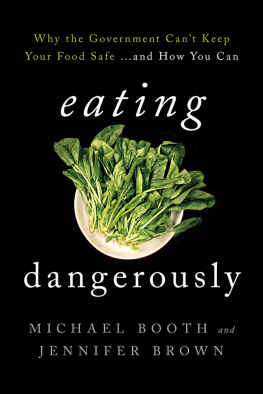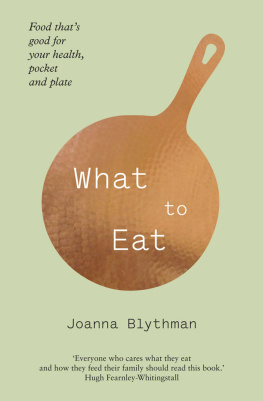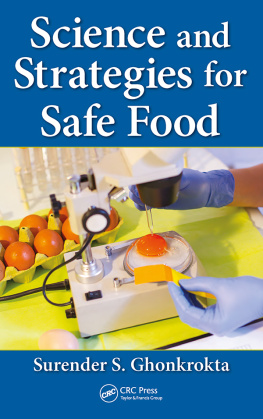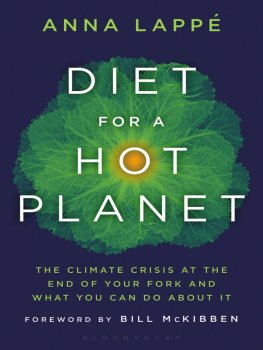Eating Dangerously
Eating Dangerously
Why the Government Cant Keep Your Food Safe... and How You Can
Michael Booth and Jennifer Brown
ROWMAN & LITTLEFIELD
Lanham Boulder New York Toronto Plymouth, UK
Published by Rowman & Littlefield
4501 Forbes Boulevard, Suite 200, Lanham, Maryland 20706
www.rowman.com
10 Thornbury Road, Plymouth PL6 7PP, United Kingdom
Distributed by National Book Network
Copyright 2014 by Michael Booth and Jennifer Brown
All rights reserved . No part of this book may be reproduced in any form or by any electronic or mechanical means, including information storage and retrieval systems, without written permission from the publisher, except by a reviewer who may quote passages in a review.
British Library Cataloguing in Publication Information Available
Library of Congress Cataloging-in-Publication Data
Booth, Michael, 1965
Eating dangerously : why the government cant keep your food safeand how you can / Michael Booth and Jennifer Brown.
pages cm
Includes bibliographical references and index.
ISBN 978-1-4422-2266-3 (cloth : alk. paper) ISBN 978-1-4422-2267-0 (electronic) 1. Food poisoningUnited StatesPrevention. 2. Food adulteration and inspectionGovernment policyUnited States. 3. FoodSafety measures. I. Brown, Jennifer, 1975 II. Title.
RA601.B66 2014
615.9'45dc23
2013037125
 The paper used in this publication meets the minimum requirements of American National Standard for Information SciencesPermanence of Paper for Printed Library Materials, ANSI/NISO Z39.48-1992.
The paper used in this publication meets the minimum requirements of American National Standard for Information SciencesPermanence of Paper for Printed Library Materials, ANSI/NISO Z39.48-1992.
Printed in the United States of America
To our families, who are always the best reasons for cooking safely and eating well
Introduction
F or about six months while researching and writing this book, we became more than a little neurotic in the kitchen. We rinsed fruits even though we planned to peel them later. Hovered and commented while watching our families crack eggs into pancake mix. Stopped eating some troubled foods altogether. Grocery shopping induced mini bouts of panic: Is it better to buy the prewashed greens in bags, or the organic bunches that werent stirred up with 10,000 pounds of other lettuces? Coworkers on lunch break learned to walk away when the conversation turned to poultry warehouses or what a norovirus outbreak looks like on a packed cruise ship.
As journalists at The Denver Post , we spent months covering the listeria outbreak linked to Colorado cantaloupe that killed thirty three people in 2011. The reporting turned into something of an obsession. Then we settled down and realized this was no way to eat, or to live. Wasnt there a way to cut down a few outsize risks without losing the joy of food and the satisfaction of sharing it with friends and family?
What we needed was what this book turned out to be: A clear explanation of some basic problems in our food safety system, followed by some succinct, practical advice on safety and the fast-changing near-future of food. We learned to stop worrying about every raw egg. Much easier just to wipe off the counter later with an antibacterial spray. We resumed eating shrimp.
But there were other pieces of advice gathered while researching this book that did stick. Our refrigerators, for example, are now set up to keep meat on the bottom, below the fresh produce that will be eaten raw. We no longer rinse raw chicken in the sink. And we each occasionally remember to toss reusable grocery bags in the washing machine. We hope thats what happens to you after you read this bookthat you will absorb some things you didnt know and use what works for you. Its not intended to scare anyone away from food altogether. Think of it as steering you through the grocery aisles, not away from them.
Eating Dangerously isnt the final word on food safety. Thats because it is difficult to put a period at the end of any sentence written about the subject. New outbreaks of foodborne illness happen weekly in America. In recent months alone, an outbreak of rare cyclospora linked to salads sickened hundreds in the Midwest with infighting among state agencies over the speed of the investigationand an E. coli outbreak from a Mexican restaurant in the Southwest put dozens at risk for kidney failure.
The FDA punctuates the bad news with optimistic new rules for safety improvements, then quickly acknowledges it hasnt nailed down the money to pay for progress. The point of this book is to provide an understanding of how the food safety net works, or doesnt, in America. In the second half of the book, we offer advice for keeping you and your family saferwhat foods to avoid if you are particularly susceptible to foodborne illness, how to know when to call a doctor, and whether buying organic means you are any less likely to get sick. In the end, we hope weve proven to be good test cases for a rational consumer approach: skeptical, but not cynical; aware, but not hysterical.
I
Should We Be Afraid of Our Food?
Sick: Its Whats for Dinner
A mericans are staring at their plates and wondering what lurks there.
Dying of a contaminated cantaloupe shouldnt rank high on a persons list of fears. Nor should bad spinach at a fast food restaurant, or undercooked hamburger, or eggs crawling with Salmonella . Yet every month seems to bring consumers a new food threat.
The cantaloupe your mom told you was the healthiest fruit, chock full of vitamins? It killed thirty-three people in 2011, the worst foodborne illness outbreak in one hundred years, on produce never before known to foster a bacteria called Listeria . Every deadly melon came from one Colorado family farm never before inspected by a government authority. In 2012, another cantaloupe scare swept Eastern states, this time from Salmonella . In 2013, the Food and Drug Administration (FDA) warned cantaloupe farmers it was tired of the outbreaks and would send inspectors directly to their packing sheds.
That chicken fresh off the grill? It came in a package literally swimming in potentially lethal Salmonella , a fact known and approved by inspectors. Chicken factories find it too onerous to remove bacteria during their increasingly industrialized processing, so many plastic-wrapped packages of chicken come with Salmonella . Federal regulators, squeezed by budget cuts and increasing production, are complicit in the gamblethey punt, and say its up to the consumers to cook out the bacteria themselves.
A takeout taco from the Mexican place with the famous chihuahua? Even as dozens got sick around the nation from a Salmonella strain and state authorities found high numbers of those sickened had eaten at the ubiquitous taco shacks with the bell on the sign, federal and state officials refused to warn consumers by publicly broadcasting the name of the chain.
Thinking of just sticking to the healthy stuff, like spinach? Producers are planning on irradiating it at the factory in the near future. That may be the good news. If they dont run it through the microwaves on the packaging line, youll still have to worry about the safety of leafy greens in the American diet. Spinach, lettuce, and other healthy greens are known as some of the most stubborn carriers of food-illness pathogens, their porous surfaces vulnerable to a host of bacteria lurking in the soil of massive farms, in the runoff from nearby farms or ranches, and in the elaborate machinery of the sorting factories.
Horse meat in IKEAs famous meatballs. Hamburger patties in school cafeterias held together with a protein glue popularly dubbed pink slime, infused by ammonia gas at the factory as a safety measure. Today food moves around the globe with lightning speed. Traditional small producers consolidate into massive food-assembly operations. Geneticists alter the very DNA of what were planning for dinner. Now more than ever, consumers need a reliable, rational gauge for judging food safety in a vast and confusing marketplace.
Next page





 The paper used in this publication meets the minimum requirements of American National Standard for Information SciencesPermanence of Paper for Printed Library Materials, ANSI/NISO Z39.48-1992.
The paper used in this publication meets the minimum requirements of American National Standard for Information SciencesPermanence of Paper for Printed Library Materials, ANSI/NISO Z39.48-1992.